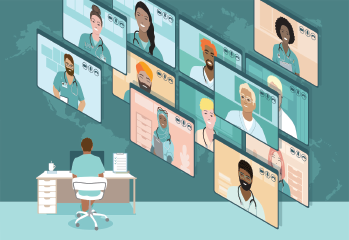
© Tasha Art / shutterstock.com
Although grand rounds have been a vital tool in providing quality clinical education since the introduction of bedside teaching at Johns Hopkins Medical School in the late 1800s, the style, format, and approach that medical schools have taken to hosting these events have all evolved considerably over the decades (J Grad Med Educ. 2013;5:560-563). The latest phase in this evolution occurred in March 2020, when the COVID-19 pandemic effectively eliminated the option of group gatherings and compelled academic programs directors to turn to a virtual format for their grand rounds.
Explore This Issue
February 2021The recent mandatory shift to a virtual grand rounds format is just the latest in a series of changes that the practice has undergone since its inception so many years ago. “The traditional grand rounds format doesn’t carry the same level of high regard that it did 50 years ago, when it was a very formal presentation that took place on Saturday mornings when everybody would show up,” acknowledged Dr. Oghalai. “Nowadays, we all recognize that work-life balance is important and additional time for conferences can adversely affect a physician’s quality of life.”
No one, however, is debating the essential value of grand rounds as an educational tool, both to convey the latest scientific medical knowledge to residents and faculty, and to help residents and medical students learn how to give presentations and gain knowledge of a topic. “Learning and keeping up with most cutting-edge material will always be relevant,” said Nicholas Rowan, MD, assistant professor in the department of otolaryngology–head and neck surgery at Johns Hopkins University School of Medicine in Baltimore. “Furthermore, the dedicated time spent on learning and education is recognized as time well-spent.”
John Oghalai, MD, the Leon J. Tiber and David S. Alpert Professor and chair of the Caruso department of otolaryngology–head and neck surgery at the Keck School of Medicine at the University of Southern California in Los Angeles, emphasized that regular group meetings are a necessary part of team building, which is key in an academic environment.
After a year of holding grand rounds via cybertechnology, the physician-educators charged with making the system work have had time to reflect on how the change from in-person to on-screen has affected this honored practice. It appears that virtual grand rounds are likely here to stay.
Attendance and Reach
In turning to a virtual format via platforms such as Zoom, WebEx, and Teams to conduct their programs’ grand rounds, medical educators note some obvious silver linings. The first and most apparent: better attendance. “At every university I’ve ever been at, it has always been a struggle to get residents and faculty to come to grand rounds, and to be on time,” said Dr. Oghalai. “Since doing grand rounds virtually, attendance has been dramatically better.”